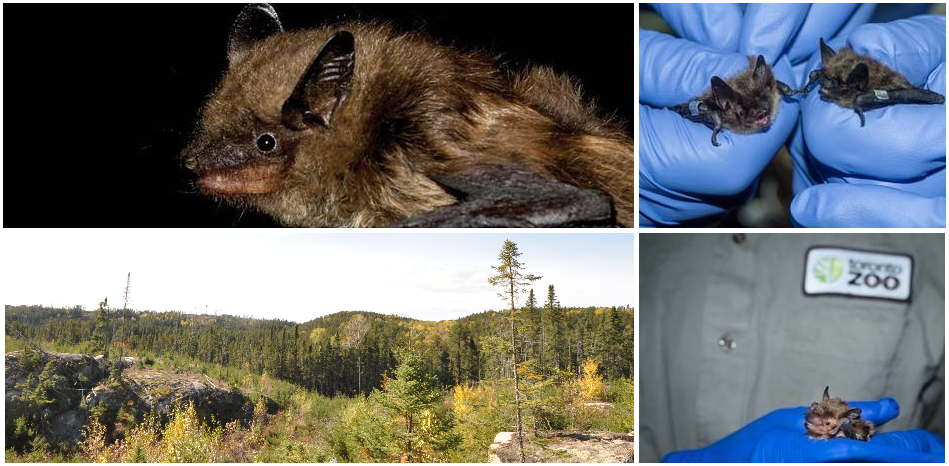TORONTO, Ont., March 4, 2020 – The Toronto Zoo’s Native Bat Conservation Program (NBCP) and the Nuclear Waste Management Organization (NWMO) are joining together to facilitate research into native bat populations in Ontario.
This new five-year agreement will invest over $1 million into studies of bat populations in Ontario and support community outreach, learning and engagement opportunities. The partnership between the Toronto Zoo and the NWMO is a natural fit given their mutual, ongoing commitment to protecting the environment, which includes the people and native species within it.
With support from the NWMO, the Toronto Zoo will develop and undertake a research program addressing knowledge gaps in the ecology of bat species in Ontario, a milestone achievement that will further inform the work of both organizations.
“We are excited to be partners with the Toronto Zoo, experts in the field of species conservation, to advance bat research in Ontario. Investing in this research is yet another way we are demonstrating our commitment to protecting people and the environment,” says Laurie Swami, President and CEO of the NWMO. “I am particularly proud that we will play a role in bringing this research and the Toronto Zoo to people in communities involved in learning about Canada’s plan for the safe, long-term management of used nuclear fuel.”
Both the Toronto Zoo and the NWMO have mandates to bring information and learning opportunities to people and communities, including Indigenous communities. A particularly exciting component of this new partnership will be shared efforts to bring this research and the importance of species conservation to people, communities and students that are interested in learning. Communities are made stronger with good neighbours and good partners, and together, the NWMO and Toronto Zoo will embrace this opportunity within native bat conservation research.
Engagement activities will include the use of local guides when scouting and walking the land, and training community members on the process of catching and tracking bats. As part of the NWMO’s commitment to Reconciliation, the organization will also provide cultural awareness training before field staff begin research and engagement work. Aligned with this commitment, both groups look forward to interweaving Indigenous Knowledge into the research program through contributions and support from traditional knowledge holders.
“My perspective on helping wildlife and wild spaces is simple – conservation is a team sport – and we need more players,” says Dolf DeJong, CEO of the Toronto Zoo. “The Toronto Zoo’s new partnership with the NWMO is an exciting opportunity to continue to grow our efforts in understanding more about native Ontario bat ecology and what needs to be done to conserve them. From our perspective, the implementation of this partnership is a fine example of community collaborations in action to save and protect species at risk.”
The Zoo’s new strategic plan focuses on saving wildlife, including native bat species, and is committed to help preserve many of Canada’s threatened and endangered animals. Since 2015, the Zoo’s NBCP has monitored bats around the Greater Toronto Area and beyond, locating all eight Ontario species in the region. Through the program, the Zoo has captured hundreds of thousands of acoustic observations, temporarily trapped hundreds of bats, and greatly contributed to our knowledge and conservation of these species in the province.
-30-
About the Toronto Zoo
The mission of the Toronto Zoo is to be a living centre for education and science, committed to providing compelling guest experiences and inspiring passion to protect wildlife and habitats. The Zoo is a member of Canada’s Accredited Zoos and Aquariums (CAZA) and is accredited by the Association of Zoos and Aquariums (AZA).
About the NWMO
The Nuclear Waste Management Organization (NWMO) is implementing Canada’s plan for the safe, long-term management of used nuclear fuel. The organization was created in 2002 by Canada’s nuclear electricity producers. Ontario Power Generation, NB Power and Hydro-Québec are the founding members, and along with Atomic Energy of Canada Limited, fund the NWMO’s operations. The NWMO operates on a not-for-profit basis and derives its mandate from the federal Nuclear Fuel Waste Act.
For more information:
Katie Gray
Manager, Strategic Communications
Toronto Zoo
kgray@torontozoo.ca
416.392.5941
Bradley Hammond
Director, Strategic Communications
NWMO
bhammond@nwmo.ca
647.259.5544

